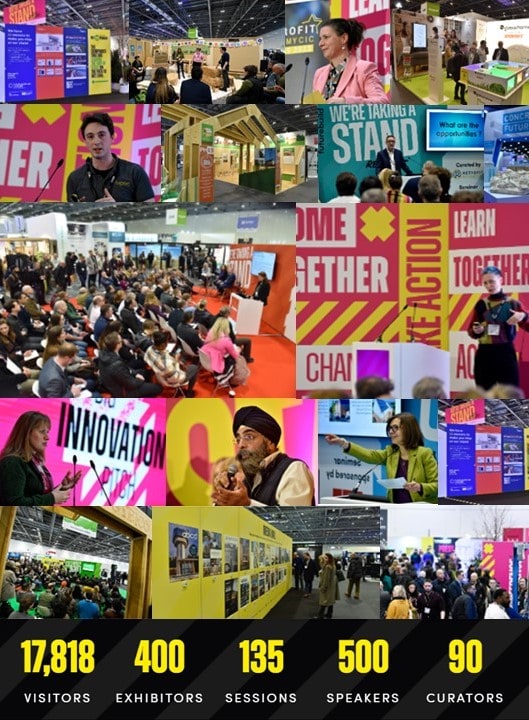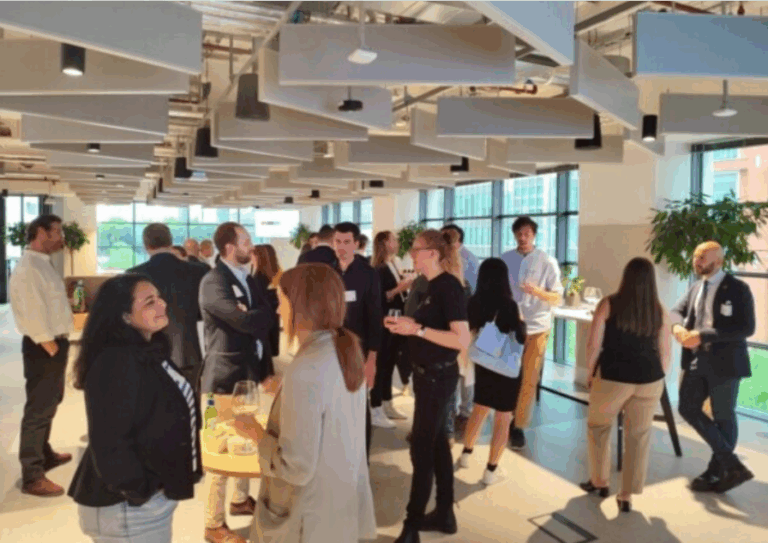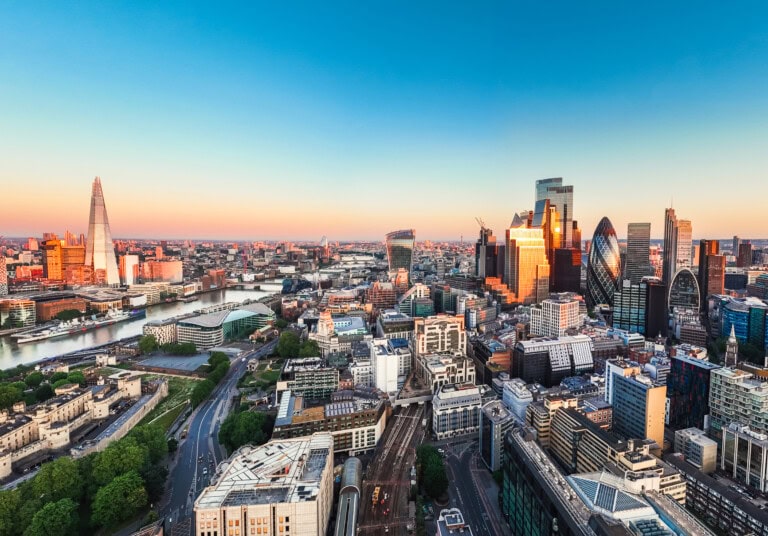UKGBC at Futurebuild 2025

Celebrating its 20th anniversary, FutureBuild will take place from March 4-6, 2025, in London. This year’s theme, Impact, underscores two decades of driving positive change in construction and community development.
FutureBuild brings together around 15k professionals committed to sustainability, innovation, and collaboration in the built environment – architect, engineer, contractor, policy makers – and offers insights, cutting-edge products, and networking opportunities to support sustainability goals.
In partnership with: Mitsubishi Electric UK, Interface and Chetwoods Architects, we are returning to Futurebuild with our award winning stand, where you can learn more about our work, and our network. As part of the 3-day event, we are participating in two main stage events, and leading on three panel discussion as well as hosting a materials workshop on our stand. See below for our full activity calendar.
Day 1 – Tuesday 4th March
12:00-12:45 How the circular economy and degrowth can avoid catastrophic tipping points
We have known about ‘limits to growth’ since at least 1972. We know that society’s use of materials for all purposes has increased from 7 billion tons in 1900 to 92 billion tons in 2017, and this is just not sustainable. We can recycle as much as we can but if we keep trying to grow GDP no matter the environmental and social costs, we risk missing our climate targets and triggering catastrophic tipping points. We then try to put a price on nature that doesn’t prohibit growth. Thinking ‘circular’ goes beyond waste and influences every decision that we make particularly for those working in the built environment. Time for an honest conversation about where we should be in 12 months? By 2030? by 2035?
Chair: Smith Mordak, UKGBC
Panel: Dr David Greenfield, SOENECS; Elwyn Grainger-Jones, Cradle to Cradle Products Innovation Institute; Teresa Domenech, University College London
Day 2 – Wednesday 5th March
13:30-14:15 How resilient is the UK built environment to climate impacts?
A session around the UKGBC Climate Resilience Roadmap, with a sneak peek at the roadmap content looking at how resilient and vulnerable the UK built environment is to climate impacts, including results of the Roadmap research as well as key insights. We will explore ‘where should we be in 12 months / 2030 / 2035’ as we will tease the actions and recommendations.
Chairs: Hannah Giddings, UKGBC; Macarena Cardenas, UKGBC
Panel: Ashely Bateson, Hoare Lea; Christine Cambrook, Buro Happold; Anna Oxenham, Mace
Location: Buildings Impact Stage
14:30-15:20 Material Matters Workshop delivered by Chetwoods Architects (UKGBC Stand)
Chetwoods Architects dive into all things sustainability when it comes to materials, including embodied carbon, health and wellbeing, and the circular economy. Information and exploration of a range of exciting material samples for an interactive session where you can challenge yourself to pick out the more sustainable material options, and identify the red herrings.
16:15-17:00 The Futurebuild Conversation – Achieving our low carbon future? Why aren’t we there yet?
As we transition to our low carbon future we find ourselves at a pivotal moment as it is only 25 years to 2050 when we need to get to the legally binding target of reducing carbon emissions to net zero. So what are the opportunities and the barriers?Heating, Ventilation and Air Conditioning are major consumers of energy in any building and the HVAC equipment that is designed and installed over the next 5 years is likely to still be in use in 2050. That means that the decisions we all make now on both new-build, and more importantly retrofit must align with those net zero goals if clients are to avoid ending up with stranded assets. Yet the technology that can help on the road to net zero already exists.
Chair: Dr Anastasia Mylona, Technical Director, CIBSE
Panel: Yetunde Abdul, UKGBC; Steff Wright, Gusto Group; Chris Newman, Mitsubishi Electric
Location: Futurebuild Arena
Day 3: Thursday 6th March
10:30-11:15 What is a ‘Regenerative Place’? and how do we get there?
The word ‘Regenerative’ is being used with increasing frequency across industry, with a growing number of perspectives on what it the concept means. There is less understanding so far, of how it translates into practice and especially how we retrofit our homes and urban spaces to bring the vision into reality for UK communities. The session will focus on Improving biodiversity and green space; offering health and social value benefits, strengthening climate resilience
Chaired by: Anna Hollyman, UKGBC
Panel: Miles Lewis, Clarion Housing Group; Carl Walker, Hoare Lea
Location: Placemaking Impact Stage
13:30-14:15 Towards a nature-positive built environment
A reflection on the built environment’s role in the global transition to a nature positive future. This session will outline our current understanding of what nature positive entails and focus specifically on addressing embodied ecological impacts from materials. It will showcase best practice examples and key principles to make a difference.
Chair: Kai Liebetanz, UKGBC
Panel: Aaron Grainger, Buro Happold; Julia Baker, Mott Macdonald; Becky Gordon, Interface
Location: Materials Impact Stage
Deep Dive into Supply Chain Decarbonisation
UKGBC will be showcasing Supply Chain Decarbonisation on our stand at Futurebuild, in a series of five sessions. We will be sharing details of our work to date including the aim, scope, plans, activity to date and our desired outcomes from this workstream. UKGBC programme leads will be heading this event, with support from Partners and Task Group members in attendance.
In addition, attendees will have the opportunity to contribute to our testing of initial ideas for action, shaping our developing plans for future work. Whilst also learning how, as stakeholders in the built environment, you can get more involved in helping to drive progress.
The Deep Dive event will take place during the following time periods:
Tuesday 4 March 11:00-12:00, 14:00-15:00
Wednesday 5 March 11:00-12:00, 14:00-15:00
Thursday 6 March 11:00-12:00
UKGBC at external panels
Day 1: Tuesday 4th March
13:30-14:15 Housing in a climate emergency – Why we need to go further and faster on housing standards – In partnership with the Good Homes Alliance
The housing sector is at a crossroads. The new Labour government has pledged to build 1.5 million new homes over the next 5 years and has set out planning reforms and the reintroduction of mandatory housing targets to help facilitate this. However, imminent updates to the building regulations following the Future Homes Standard consultation are not expected to go far and fast enough in addressing the urgent need for change to meet our climate commitments, or to deliver the healthy homes with low bills that we need. 250 prominent industry organisations have supported a letter to Government calling for a better standard to be adopted. In tandem with this, progressive local authorities are adopting their own ambitious net zero planning policies that set higher standards above and beyond national levels. Join this session to find out the latest updates from those striving to further and faster on standards in order to meet our climate commitments.
Chaired by: Julian Brooks, Good Homes Alliance
Speakers: Lewis Knight, Bioregional; Julie Godefroy, CIBSE: Jo Wheeler, UKGBC
Location: Buildings Impact Stage
17:30-18:00 NETXIT: How net zero became the new Brexit and what it means for sustainability and the built environment
With the Reform Party now second in the political polls and officially campaigning for an end to the UK’s Net Zero target, this session looks at how climate change became the new Brexit and what an attack on the UK’s net zero ambition means for sustainability professionals and the built environment.
Chaired by: Cathy Barlow, Smith Goodfellow PR and Paul Cahalan, UKGBC & CIPR
Location: Placemaking Stage
Day 3: Thursday 6th March
14:30-15:15 Tackling emissions from homes in use: exploring the opportunities – in partnership with Carbon Trust
The UK has ambitious targets to accelerate the provision of homes across the country. With an increased volume of new homes there are challenges to address in minimising the impact of energy they consume. The Carbon Trust has worked over many years with organisations in the built environment to understand and reduce emissions across the value chain. Drawing on this experience and real examples, the Carbon Trust and guests will discuss the opportunities and practicalities of reducing the carbon emissions associated with the operation of homes in the UK.
Chaired by: Louise Shackley, The Carbon Trust
Panel: Anna Hollyman, UKGBC; Joe Webb, Kamma
Location: Energy Impact Stage
14:45-15:45 Looking back, looking forward – are we doing enough?
Reviewing 20 years of Futurebuild/Ecobuild conference programmes we see that steps have been made towards achieving sustainability, climate change and nature goals, this last being a feature of more recent years and then a concerning number of steps backwards, as shown in our timeline. What have we achieved (or not) to date and how can we now make the progress that is urgently needed?
Chaired by: Smith Mordak, UKGBC
Panel: Tadj Oreszczyn, UCL Energy Institute; Anusha Shah, Arcadis; Polly Turton, Love Design Studio/Shade the UK; James Low, Mace; Dr Emily Nurse, Climate Change Committee
Location: Futurebuild Arena
Related
UKGBC at Futurebuild 2024

Networking Reception and AGM

An Introduction to Climate Change and Carbon Reduction in the Built Environment (On-demand)

Site Visit to Unusual Rigging HQ

